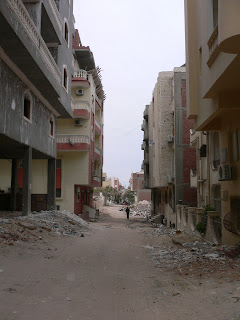 I was delighted to receive an invitation to an Egyptian-European couple's wedding. It was held in a banquet hall of a large hotel. When I entered with my friends, the dj was playing lively Arabic tunes. The Egyptian family members and friends were seated on the left side, and the other guests and colleagues on the other. The chairs were decorated with balloons, and there were two large hearts on the podium, displaying the couple's names.
I was delighted to receive an invitation to an Egyptian-European couple's wedding. It was held in a banquet hall of a large hotel. When I entered with my friends, the dj was playing lively Arabic tunes. The Egyptian family members and friends were seated on the left side, and the other guests and colleagues on the other. The chairs were decorated with balloons, and there were two large hearts on the podium, displaying the couple's names.There was no MC to lead the occasion or to announce what would happen next, like in European weddings – one of the biggest differences I observed. At least that solved the issue of multi-lingual gathering. The whole evening flowed seamlessly from one event into other, and Oriental music played a big part. Everyone took snapshots of the bride and the groom. Then the guests were invited to dance – ladies with the bride, and men with the groom, both in their own circles.
Then it was time for a lavish buffet dinner. There was a everything one could possibly imagine, from appetizers to salad, soup, and meat The chef had made delicate and imaginative ornaments from vegetables and fruits. Because of the Muslim family, only soft drinks were served, no alcohol. After dinner the rings were brought forward on a red pillow. The bride placed the fingertips of both hands together, and the groom slid the engagement ring from right hand to the left, along the fourth finger. The bride repeated the same for the groom, and they exchanged kisses – on the cheek and forehead, as was appropriate.
The newlyweds then had their first dance as brand-new Mr. and Mrs. Both had chosed a special song, one in English, and the other in Arabic by a Egyptian celebrity singer, Amr Diab. More dance followed, and first the parents, and then all the guests were invited to join.
We proceeded to sample the desserts – cakes, tarts, cookies, and baklava pastries. We were all given star-rain sticks, and as we lit them, the wedding cake was carried forward, as well as a long, sharp knife. The couple was assisted by the manager of the hotel to cut the cake, and again this was celebrated by dancing.
Gifts were handed to the couple. As the custom went, we took our turn to extend an envelope, containing money. Then we climbed on the podium, and took pictures with the bride and groom.
Four belly dancers emerged, dressed in rather revealing apparel. They performed several numbers, and changed costumes in between. Then four men, dressed in traditional, loose garments, danced with long sticks, beating them on the ground according to the rhythm. The lead belly dancer performed a routine in front of the bride, and invited her to join her on the dance floor. The groom's turn came next. Groom's friends jumped to the floor, and danced around him.
There was one more typical Egyptian dance number, called tanoura (pictured). It is performed by a man, dressed in several layers of colourful skirts, spinning around for nearly ten minutes. The skirts were lifted high, at times covering the face of the dancer. At one point he removed the topmost skirt, and formed a bundle, resembling a baby, while he kept whirling around without break.
Five hours later the newlyweds made their exit. Musicians playing a drum and traditional horn lead the way, and the guests followed at the wake of the couple. Women took a souvenir from the floral centrepiece as they left the hall. A car with a driver was waiting outside, and the escort customarily honked the horn all the way until the destination.
